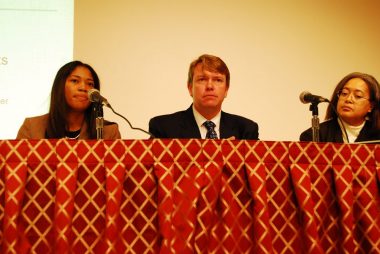The city of Greensboro has not always been viewed among journalists as the most open and accessible, but despite past transgressions, Greensboro is attempting to change and bring more sunshine to its proceedings.

Citizens and government officials from Greensboro convened for a panel focused on the city’s response to public records requests as part of Sunshine Day on March 16.
Headed in part by the Neighborhood Congress, a grassroots organization that serves as an umbrella group for other neighborhood organizations, Greensboro has made a concerted effort during the last few years to increase its government transparency.
Marsh Prause, a chair in the Neighborhood Congress, emphasized the need in Greensboro for private citizens to understand public records laws.
“We, over the years, have heard difficulties that normal people trying to do everyday business were having problems trying to get public records,” Prause said.
He cited examples where people were directed to one organization, only to be sent to another, then another and finally back to the first organization. Prause described a cycle of misinformation, disinformation and ignorance about what is and is not public record that perpetrates the system.
According to Prause, one resident he worked with waited more than three years for information.
Denise Turner, assistant city manager of Greensboro, is handling the proposal for Greensboro to expand its handling of public records. She expounded on the idea of education about public records laws, but for the civil servants that handle the requests.
She emphasized the need for training workers who disseminate records about the nature of the records themselves. Turner is proposing a no longer than 48-hour wait time for simple records requests and more streamlining to lessen the public records workload on city employees.
She also said that the city needs a certified person who can pull together complex records that require cooperation from multiple agencies.
“We want to get away from the ‘no one’s responsible, so no one does it’ mentality,” she said.
Turner said the next steps for the city were to meet with the Neighborhood Congress and local media to hear their feedback on the new program. The proposal will be placed before the city council for adoption April 6.
“I have to say at this point there are a number of requests that we’ve received that his system does not deal with,” Turner said.
The new system is mainly for tracking the requested information rather than what is or is not public record. The training for civil servants will differentiate between the two.
But, this determination is not always so easy, said Becky Jo Peterson-Buie, chief deputy city attorney for Greensboro.
“The problem comes to play in determining sometimes whether or not the document is actually a public record,” she said.
Any tangible item that can be held, seen or listened to that deals with the transaction of public business is considered a public record. Buie’s office has ruled that personal e-mails, specific law-prohibited items and documents about fair housing are all exempt.
Releasing records that should be kept private, Buie said, does carry consequences.
“There are some punitive measures if you release something that’s not public,” she said. “It’s considered a misdemeanor.”
— by Lauren Ramsdell, ’13


